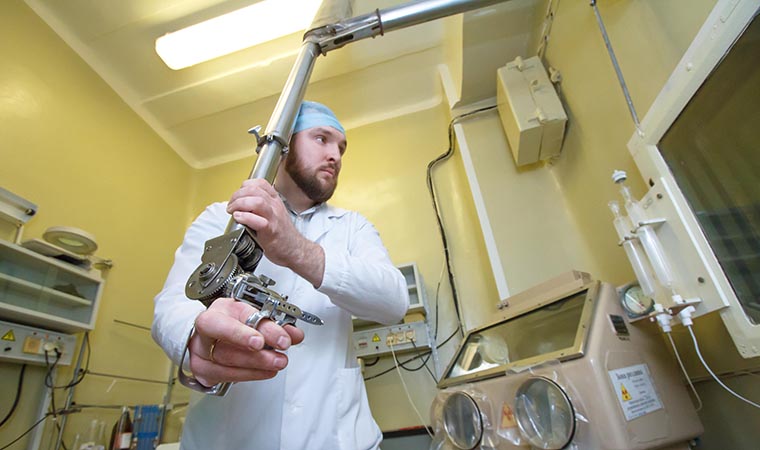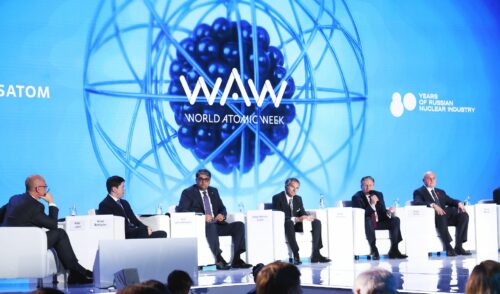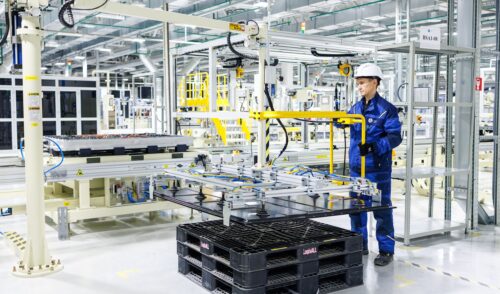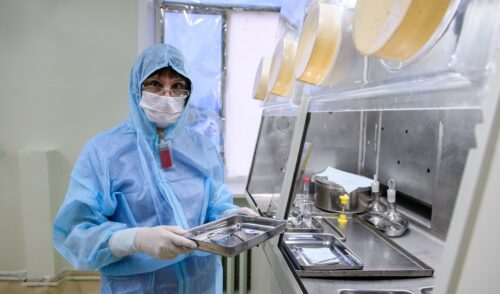
Nuclear energy encapsulated
back to contentsAttempts at developing betavoltaic batteries, a new generation power source, have been made for more than 50 years, but as yet with no commercial success. Based on Nickel-63, a clean energy source, the battery emits only beta particles and no harmful gamma radiation. Having a half-life of 100 years, this isotope does not occur in nature and can be produced only artificially. The production process includes two enrichment stages, first obtaining Ni-62 by centrifugation, then enrichment and separation of Ni-63. Some countries, for example the USA, possess technologies yielding low-enriched nickel with 20% of Ni-63, which is insufficient to produce a beta cell. Since Rosatom has reached 80% enrichment, it is time now to apply this technology.
The Russian betavoltaic battery is a joint project of the Mining and Chemical Plant (MCP), the Russian Academy of Sciences and a number of other companies. “MCP has several tasks in the project, the key of them being system integration,” says Dmitri Druz from MCP. “We are now working on the improvement of the process technology for highly-enriched nickel-63 and attempting to make a pilot version of the beta cell.”
The operating principle of a beta cell is based on a betavoltaic effect when beta radiation of nickel isotopes is converted into electric power in a semiconductor. It is analogous to the photovoltaic effect with the only difference that electron hole pairs in the semiconductor are formed by beta particles (fast electrons) rather than photons. “Basically, a Ni-63 based battery has four components: a semiconductor converter of beta radiation, an ultra thin layer of highly-enriched Ni-63 on it, electric contactors and a miniature case,” Dmitri Druz explains.
MCP expects to produce a pilot beta cell in late 2016 or early 2017. It will have a form and size of microwatt power sources used in neurostimulators and cardiac pacemakers. Forms and sizes will be later adapted to specific applications and customer requests. “Beta cells can have either standard, coin or cylinder shaped form factors or be made as microminiature batteries,” Druz says.
“It is a breakthrough technology outperforming all known counterparts and more than one step ahead of the competition,” adds MCP CEO Pyotr Gavrilov. “To finalize the project, we still have to do some fundamental and applied research. Rosatom’s other technologies, which are also ahead of competition, will be used for this purpose. We are sure that our unique product will be piloted by the year end.”
Although MCP presented only information materials at Archimedes in Moscow, interest of the audience was nevertheless great. Most questions were asked by representatives of microelectronics companies.
“We decided to present this invention because it may be pivotal for many industries,” Dmitri Druz said. “Beta cells will offer them excellent opportunities for technological development, which is impossible without energy. We continue our research effort, and results are very optimistic already now. Professionals should know that the market will soon have a new power source and design their systems taking into account this information.”
Medicine is the most promising market for the betavoltaic technology. Cardiac pacemakers use plutonium-238 as a source of energy and serve for about 10 years. Pacemaker replacement is a complicated surgery that will not be needed for 50 years with a new beta cell.
The nuclear industry can use the betavoltaic technology in temperature and radiation sensors installed in the reactor core. Such sensors will need no repair or replacement for the same 50 years.
Betavoltaic batteries will become essential components of autonomous navigation equipment, telemetric and monitoring systems. Long-lasting power sources will be eagerly accepted by the defense industry, underwater system developers and people working in harsh environmental conditions.




